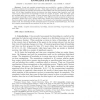Free Online Productivity Tools
i2Speak
i2Symbol
i2OCR
iTex2Img
iWeb2Print
iWeb2Shot
i2Type
iPdf2Split
iPdf2Merge
i2Bopomofo
i2Arabic
i2Style
i2Image
i2PDF
iLatex2Rtf
Sci2ools
130
click to vote
CORR
2002
Springer
2002
Springer
Complete Axiomatizations for Reasoning About Knowledge and Time
Sound and complete axiomatizations are provided for a number of different logics involving modalities for knowledge and time. These logics arise from different choices for various parameters regarding the regarding the interaction of knowledge with time and regarding the language used. All the logics considered involve the discrete time linear temporal logic operators `next' and `until' and an operator for the knowledge of each of a number of agents. Both the single agent and multiple agent cases are studied: in some instances of the latter there is also an operator for the common knowledge of the group of all agents. Four different semantic properties of agents are considered: whether they have a unique initial state, whether they operate synchronously, whether they have perfect recall, and whether they learn. The property of no learning is essentially dual to perfect recall. Not all settings of these parameters lead to recursively axiomatizable logics, but sound and complet...
Related Content
| Added | 18 Dec 2010 |
| Updated | 18 Dec 2010 |
| Type | Journal |
| Year | 2002 |
| Where | CORR |
| Authors | Joseph Y. Halpern, Ron van der Meyden, Moshe Y. Vardi |
Comments (0)

